- Home
- Elmore Leonard
Cuba Libre Page 3
Cuba Libre Read online
Page 3
"You pronounce it pretty good," Tavalera said, "but the Guardia are not police during time of war. We're like those people, the caballerla, except we don't stay in Havana and go sightseeing, we hunt insurrectos. We the first to go to war, the front line always." He said, "You saw the ship that was destroyed?" nodding toward the harbor. "They say a fire began in the coal and spread to the munitions. It's too bad, uh, all those men dying. Tell me, you bring the horses from where, Texas?"
"Arizona," Tyler said.
"That's a long way. Your family live there?"
"I don't have a family, not anymore."
Tavalera looked at the stock pens and then at Tyler again. "May I ask how much you sell the horses for?"
Charlie Burke stepped in. "Hundred and fifty pesos, any horse you want."
Tavalera was nodding. "But with the duty tax, how do you make money? Or you don't pay so much of the duty. Listen, I ton't care, it's your business."
"We're delivering this string," Charlie Burke said, "to Mr. Roland Boudreaux in Matanzas, along with some beef cows. Giving him a special deal."
"I know Mr. Roland Boudreaux," Tavalera said, and looked at Tyler again. "I visit in Mexico when I was young. At that time I want to be a cowboy like you. But I return home and they accept me to attend the Colegio Real Militar. You know what that is? Like your West Point. I was honored to be assigned to the Guardia Civil when I was in Spanish Africa, then they send me here at the beginning of the second Cuban insurrection, February 1895, again assigned to the Guardia Civil." Tavalera was saying, "In these three years..." as Fuentes called to them:
"Lieutenant Barban ask how much for all five horses."
Charlie Burke answered him. "You know what we're asking."
Tyler watched the Guardia officer's expression turn hard, not caring for this interruption.
He waited another moment before saying, "In these three years I've come to love this country," telling it in a flat voice with an accent, cold, stating a fact. "After the war I intend to stay here to live in Matanzas, the most beautiful city in Cuba." He glanced at Charlie Burke. "Where he say you going to deliver these horses."
And now Fuentes was calling to them again.
"Lieutenant Barban will give you four hundred pesos for the five horses. Right now, cash money."
Tavalera said to Tyler, "They're not worth it, the horses are too small," as Charlie Burke called back to Fuentes:
"Tell him a hundred and a half each, seven fifty. Pesos, escudos or double eagles, we don't care."
"Teo's worried," Tavalera said, "they won't be able to procure horses."
Tyler turned to him. "Why's that?"
Tavalera said, "The war," sounding surprised that he had to explain this. "Not the War of Insurrection, but the one that's coming soon. You blame us for blowing up your battleship and your government will use it to declare war on Spain. Avenge the blowing up of the ship and help the poor Cuban people, so oppressed. But the true reason will be so you can have Cuba for yourself, a place for American business to make money."
Tyler said to him, "Did you blow up the Maine?" Tavalera shrugged and said, "Perhaps."
Sounding to Tyler as though he didn't care one way or the other.
Now Fuentes was calling to them, saying, "He's attracted to the bay with the star, but he says it's too small to be worth a hundred and fifty pesos."
"Tell him," Charlie Burke said, "we don't sell 'em by the pound. That's a saddle-broke cutting horse, can turn on a dime and leave you five centavos change. Ask him if he plays polo. That's what Boudreaux's buying his string for."
Tavalera said, "Rollie thinks he's going to be playing polo?" as Fuentes was saying:
"The lieutenant wants the saddle put on the bay with the star, so he can ride her, see what he thinks." Tyler said, "He wants it put on?" "He wants us to, yes."
Tyler looked across at Teo Barban. "You say you're with a cavalry outfit?"
The officer turned to face him. "Pavia Hussars. You heard your man."
"Well, if you know how to ride, you ought to know how to saddle a horse."
Teo said, "Yes?"
He didn't get it.
"What I mean," Tyler said, "if you're not helpless, you can saddle it yourself. I'm not your rnozo."
He understood that, staring at Tyler as if he couldn't believe anyone would speak to him this way. Now he was talking a mile a minute to the other hussar officers and to Tavalera, including him; Tyler seeing how a spoiled kid from Spain acted when the help talked back and he didn't get his way--no different than spoiled kids Tyler had seen at home. Now Fuentes was hurrying over, stooping to pick up the saddle.
Tyler placed a boot on it.
"Who's putting it on, you or him?"
"I can do it; it's nothing to saddle a horse."
"We don't work for him," Tyler said.
Fuentes shook his head. "You take it too far."
Teo was yelling, gesturing to Lionel Tavalera, who was listening to him, nodding, and seemed interested. But then he shrugged, shaking his head, and said to Tyler, "He wants me to give you my sword. Teo believes you insulted him."
Tyler said, "He wants me to sword fight with him?" Grinning, because it sounded funny, like he was talking about playing a kids' game.
"That's enough," Fuentes said. "All right? Please, let's go, we finished here."
"Go on with your business," Tavalera said. "I can speak to him, tell him to behave as a gentleman."
Fuentes said, "We have to go to the customhouse before they close."
Tavalera said, "Yes, go. I can take care of this, it's nothing."
All Charlie Burke said to Tyler was, "You're some horse trader. Pick up your chair and let's go."
Tyler swung the saddle to his shoulder and stood there looking at Lionel Tavalera and the hussar officers. He said to Fuentes, "They won't bother the horses, will they?"
"They don't want any horses today, they change their mind," Fuentes said. He hurried Tyler and Charlie Burke away from there, out of the field and along the road to the customhouse, telling them he would speak to the custom people and to leave the filling in of the declaration to him. "We finish and take the ferry to Havana. Mr. Boudreaux say he can see you tonight at the hotel. He look at the horses tomorrow, pay you, we put the horses aboard the ship again and go to Matanzas. Is not very far." He said to Tyler, "You been there, uh?"
"A long time ago."
"But you know people there?"
"I was a boy then."
"Perhaps someone will remember you. Sure, you never know. See over there? The sugar warehouses, biggest in the world. That building? The electric lighting plant. And there? The Plaza de Toros, the Regla bullring. The famous Gentleman Matador from Spain, Mazzantini, will perform there Sunday, again. Last Sunday twice they gave him both ears. It's too bad you won't be here. Maybe when you come back. Let me ask you something," Fuentes said. "Do you have a pistol?" Tyler looked at him. "In my poke."
"Keep it on you after we go to customs. Don't tell them you have one or you have to give it up."
Tyler said, "You're worried about Teo, that dandy? The Guardia, Tavalera, said he'd speak to him."
Fuentes said, "Yes, but what is he going to tell him?"
Lionel Tavalera watched the two Americans and the mulatto as they walked off toward the customhouse. He had seen the mulatto before in Matanzas and knew of him, an employee of Rollie Boudreaux, the polo player, but had not decided yet if he should trust him, or if it mattered whether he did or not.
Now he looked at the three hussar officers lounging against the rails of the stock pen, their kepis cocked over bored expressions, the way they were known to pose. Walking toward them, Tavalera said, "Teobaldo?"
The hussar straightened to stand half turned, looking along his shoulder at Tavalera, waiting as the Guardia officer stopped only a few feet from him.
"Let me ask you, did you think the cowboy was going to fight you with a sword?"
"If he was a man," Teo said.
"You think, out on the western plain of his country, a primitive place to live, he learned to fence? Use the 8pSe, the saber?"
Teo shrugged.
"Don't you realize," Tavalera said, "if you drew your sword the cowboy would have shot you?"
"He had a pistol? Where was it?"
"Somewhere, you can be sure. Where he lives they all carry pistols and use them to settle their differences." He paused and said, "You wanted to kill him?"
"I want to cut him," Teo said, drawing a finger across his cheek. "Give him a scar to remember this day." "But who is he? Do you know?" "A yanqui. You saw him."
"And I say again, who is he? Does he have friends here, a connection with wealthy Americans? He delivers the horses to one. It isn't possible to bring horses to Cuba and make a profit, but he brings horses. As a favor to the wealthy American? The other American, the old one, tells me they have cows, too, they ship to Matanzas. Yes, and what do they do then, turn around and go home? What else is on that boat, the Vamoose, that rusting corruption? Do you think you should know more about this cowboy before you scar his face?" Tavalera waited.
Teo said, "I don't care if he knows someone here or not, he insulted me."
"By not saddling the horse for you?"
"By his manner, the way he spoke to me."
"Where are you from, Madrid?"
"Of course. And you are from where, Africa?" His companions grinned. "Be careful," Tavalera said.
"Oh? You aren't from Africa? I heard you were born there."
Tavalera said, "Look, I know what they say about you. You have a reputation and it gives you confidence. So the next time you see the cowboy you offer him pistols, uh? Here, take your pick."
"If I feel like it."
"If you feel like it," Tavalera said, knowing this young man as he had known dozens before him. "You say about me for your companions to hear, He's from Africa. The same as saying, What does he know of anything? I admit it, I was born there--why not?rain the penal colony at Velez de la Gomera, where my father was superintendent. And I returned to Africa with the Guardia, to Melilla during the war with the Iqar'ayen Rifs. Of course you know of that war. But let me ask you something. Can you imagine what it's like to cut off a man's hands?" He paused. "To put out his eyes with a bayonet?" Again he paused. "To bury a man alive in the sand?"
His gaze held on Teo, now with the feeling he was wasting his time, Teo waiting for this to be over.
"You don't say to me," Tavalera said, "you'll do some thing if you feel like it. You only do what you feel like if I say it's all right. You understand?" He waited until Teo gave him a nod. There. "But listen," Tavalera said, "I can be a sympathetic person. Ask my permission first. That's all you have to do."
Chapter Three.
VIRGIL WEBSTER HEARD A VOICE with an accent speaking English telling somebody this man was in shock. Talking about him. Blown senseless by the ex plosion, fished out of the water for dead and taken aboard the City of Washington. Brought to San Ambrosio early the following morning. Virgil knew that. He knew he'd been in this hospital staring at a ceiling that was flaking and needed paint two days now. What he didn't know was why he couldn't move or speak, or why he didn't blink his eyes when a hand passed back and forth in front of his face. Lying here like he was made of stone. Every once in a while seeing a face looking down at him. A face that was usually an American. With a hat on. A correspondent--that was it--with a tablet, writing things down as the voice with the accent told the correspondent this man was in shock due to a severe head injury. Or he may have suffered a stroke. Though from his appearance, the voice said, this one seemed in reasonably good shape.
Oh, was that right? Then how come he couldn't move?
Virgil heard men screaming.
He heard a man moaning, calling for his mother. He heard a voice fairly close by saying, "I can't move my legs." And a voice saying, "I can't see. Will somebody help me? I can't see."
The screaming and moaning went on and on, not close by but somewhere else in the room or ward or wherever he was.
A hand touched his face, moved back and forth in front of his eyes. A woman's voice without an accent said, "Can you hear me?"
She wasn't one of the nurses; they talked in Spanish or had accents. He wanted to ask her what she thought he was doing, sleeping with his eyes open?
The woman's voice said to somebody else, "There is so little we can do."
A man's voice said, "Miss Barton?" and then said something to her Virgil couldn't make out.
The woman's voice said, "I've been able to identify only twelve so far. Many are so horribly burned." Virgil heard her sigh. "And the rest--I'm told as many as two hundred are still in the ship."
Virgil was sure he wasn't burned or he'd feel it. He heard the woman say she'd been in the provinces distributing food to the reconcentrados, Cubans the dons locked up in camps to starve to death. The woman sounded kind of old. Then, close to him, he heard her say, "Dear, can you tell me your name?"
He was Private Virgil Webster, a seagoing marine off the USS Maine, but for some reason couldn't form the words to tell her. He wanted to. Christ, yes. Virgil Webster. Home: Okmulgee, Indian Territory. Left there to become a fighting marine. Look at my tattoos. Semper Fi on one arm, with the Marine Corps insignia. In Memory of Mother on the other, though it didn't mean his ma was dead, he just liked the looks of it, the flower and the gravestone cross. But somebody better tell her he wasn't dead either, else she'd see a newspaper or hear about the Maine and be worried to death. His ma was part northern Cheyenne.
Virgil Webster, twenty-four years old and into his second five-year enlistment. Joined when he was sixteen, inspired by stories his uncle Hartley Webster told. Uncle Hartley a marine who'd fought in Korea in the spring of '71: steamed up the Han River aboard a gunboat and beat hell out of the Koreans for mistreating American merchant seamen, killed two hundred fifty of them and lost only two marines. Virgil joined up looking for action: guarded a quarantine camp at Sandy Hook, New Jersey, for people who'd come off ships immigrating here and were found to have cholera. He guarded Southern Pacific railroad yards during a strike and marched in the dedication ceremony of Grant's Tomb. He got in trouble once in Venezuela, there protecting a consulate, part of a marine detachment off the USS Chicago. They all got drunk and the captain was court-martialed. Guayra, Venezuela... Reupped in Norfolk.
Assigned to the USS Maine November the tenth of last year at Newport News, Virginia, where she was taking on coal. January the eighteenth she was coaled again at Key West. January the twenty-fourth, with the North Atlantic Squadron sixty miles off Key West, the torpedo boat Dumont came alongside to deliver a message from the Navy Department. By 11:00 P.M. the Maine had her steam up and was bound for Havana. Twelve hours later a Spanish pilot was bringing her into the harbor. A rumor had gone around they'd be in New Orleans for Mardi Gras, representing the fleet. Well, they were supposed to have pretty much the same kind of carnival here, so Havana didn't sound too bad. Except, as it turned out, none of the crew was allowed ashore, just officers. Virgil asked Captain Sigsbee's orderly, twenty-eight years in the military, with the army out West half of it and now a career marine, "How come just the officers?"
Sigsbee's orderly said, "Because the dons don't like it we're here to begin with, and you smart alecks'd be sure to make trouble."
Virgil asked the career marine, who heard things on the bridge and standing outside the captain's quarters, "How come we are here?"
"Making a friendly call on the dons."
"We got here and sat out in the stream till it was good and light so as not to surprise them coming in." "Is that a question?"
"When did we become friends with them?"
"Would you understand the situation if I explained it to you?"
"Well, I been to school."
"How far?"
"The sixth grade."
"We're here to protect American citizens and their property."
"Protect them from what?"
>
"Unenlightened people with anti-American aims. Or," the career marine said, "you could say we're here in case it looks like the Cubans are gonna take over their own country before we get a chance to do it ourselves. But don't tell nobody. That's between Captain Sigsbee, the Secretary of the Navy and Bill McKinley."
So Virgil never got to go ashore. One of the midshipmen who did, delivering messages to the consulate, said the city was full of beggars and Spanish soldiers; he said people walked in the middle of the street, rode horses holding umbrellas over their heads, and the women wore so much white face powder they looked like they were dead. Virgil said he'd like to see them anyway. The midshipman said don't step in the gutters; some places there was poop in the gutters. He said hey, he bet that's why everybody walked in the middle of the street.
Tuesday, February the fifteenth, the sun set at 5:36 P.M.
There it was hanging over the outskirts of Havana and the next minute gone for the day, the way it did in the tropics, disappeared on you as you watched. The sky became overcast and pretty soon it was pitch-dark.
That afternoon they had set up targets to practice with their new Lee magazine rifles. Before long, though, there was the Alfonso XH in the background and rifle practice was halted in case the dons became nervous. Without anyone noticing it right away, the Maine had drifted on her anchor to a northwest heading, putting her starboard 10-inch battery on Morro Castle, on the old La Cabafia fortress next to it and on the Spanish warship. The Maine's port batteries were now bearing on the city. Virgil knew it was the wind and tide had put the ship in this heading--one they'd take if they were going to shell the city and its forts--but it had never happened before tonight. Strange. Officers and men were all talking about it.
At 8:00 I'.M. the Officer of the Deck reported the ship secure, all hands aboard except four officers who'd gone ashore on overnight liberty.
At 9:00 P.M. two bells, the bosun piped the ship down for the night: all hands not on watch lay below and turn in. Ten minutes later the marine bugler sounded taps. This night being hot and muggy they had permission to sling their hammocks topside if they wanted, go to sleep breathing flesh air.

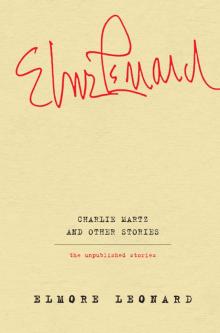 Charlie Martz and Other Stories: The Unpublished Stories
Charlie Martz and Other Stories: The Unpublished Stories Elmore Leonard's Western Roundup #2
Elmore Leonard's Western Roundup #2 Fire in the Hole
Fire in the Hole Tishomingo Blues (2002)
Tishomingo Blues (2002)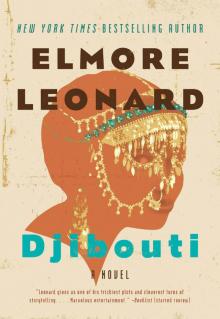 Djibouti
Djibouti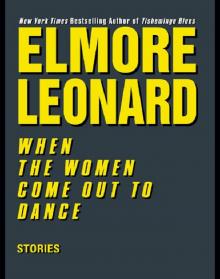 When the Women Come Out to Dance: Stories
When the Women Come Out to Dance: Stories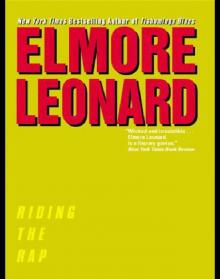 Riding the Rap
Riding the Rap Moment of Vengeance and Other Stories
Moment of Vengeance and Other Stories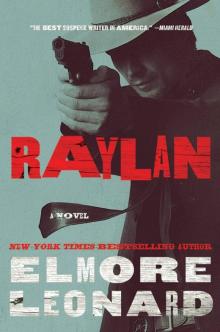 Raylan
Raylan Touch
Touch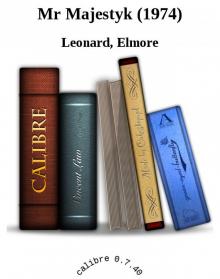 Mr Majestyk
Mr Majestyk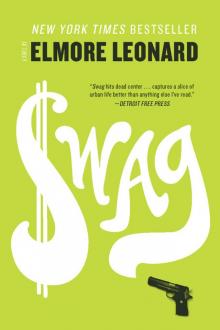 Swag
Swag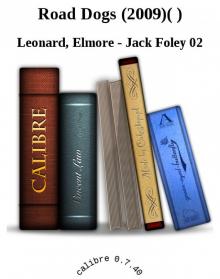 Road Dogs
Road Dogs La Brava
La Brava The Hot Kid
The Hot Kid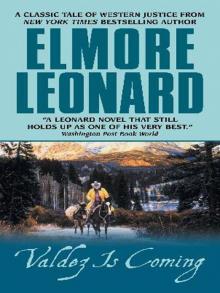 Valdez Is Coming: A Novel
Valdez Is Coming: A Novel Be Cool
Be Cool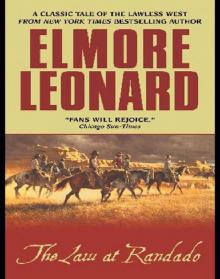 The Law at Randado
The Law at Randado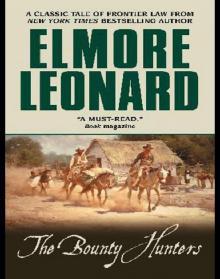 The Bounty Hunters
The Bounty Hunters When the Women Come Out to Dance
When the Women Come Out to Dance 310 to Yuma and Other Stories (1953)
310 to Yuma and Other Stories (1953)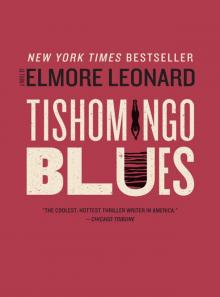 Tishomingo Blues
Tishomingo Blues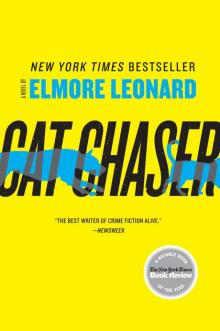 Cat Chaser
Cat Chaser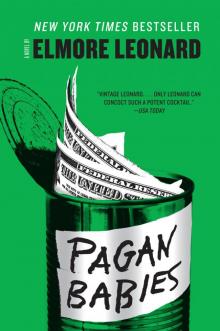 Pagan Babies
Pagan Babies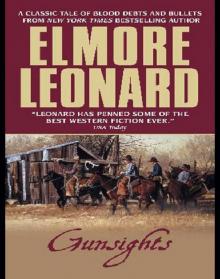 Elmore Leonard's Western Roundup #1
Elmore Leonard's Western Roundup #1 52 Pickup
52 Pickup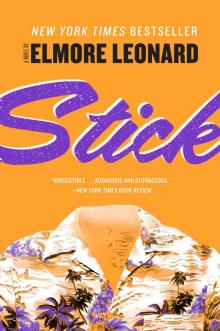 Stick
Stick The Moonshine War
The Moonshine War Valdez Is Coming
Valdez Is Coming City Primeval
City Primeval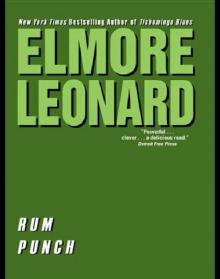 Rum Punch
Rum Punch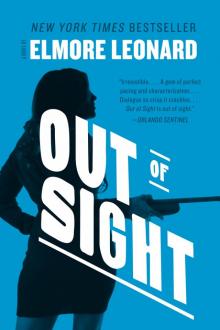 Out of Sight
Out of Sight Naked Came the Manatee (1996)
Naked Came the Manatee (1996)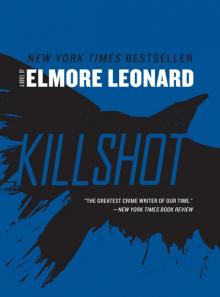 Killshot
Killshot Cuba Libre
Cuba Libre Forty Lashes Less One
Forty Lashes Less One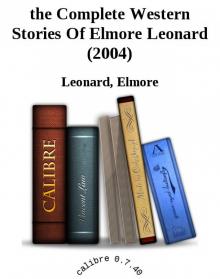 The Complete Western Stories of Elmore Leonard
The Complete Western Stories of Elmore Leonard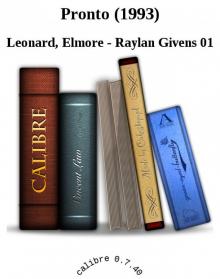 Pronto
Pronto Split Images
Split Images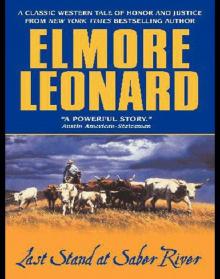 Last Stand at Saber River
Last Stand at Saber River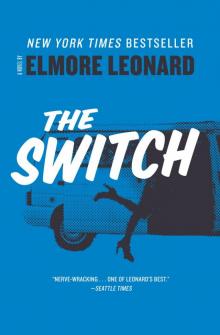 The Switch
The Switch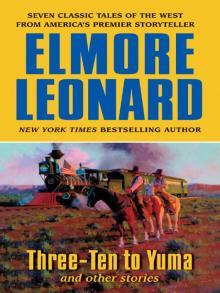 Three-Ten to Yuma and Other Stories
Three-Ten to Yuma and Other Stories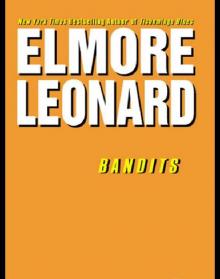 Bandits
Bandits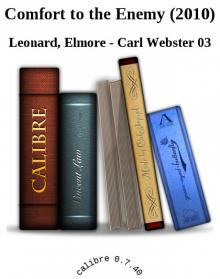 Comfort to the Enemy and Other Carl Webster Stories
Comfort to the Enemy and Other Carl Webster Stories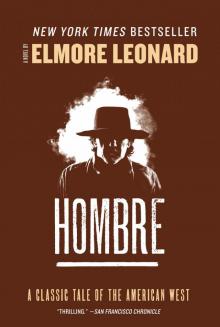 Hombre
Hombre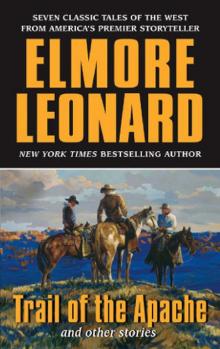 Trail of the Apache and Other Stories
Trail of the Apache and Other Stories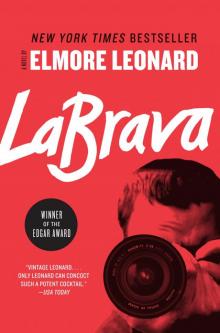 LaBrava
LaBrava Gold Coast
Gold Coast Jackie Brown
Jackie Brown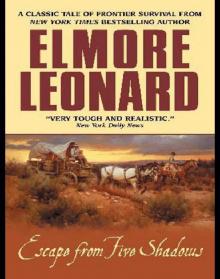 Escape From Five Shadows
Escape From Five Shadows Karen Makes out (1996)
Karen Makes out (1996)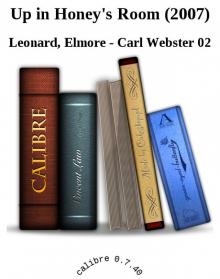 Up in Honey's Room
Up in Honey's Room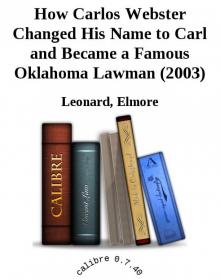 How Carlos Webster Changed His Name to Carl and Became a Famous Oklahoma Lawman (2003)
How Carlos Webster Changed His Name to Carl and Became a Famous Oklahoma Lawman (2003)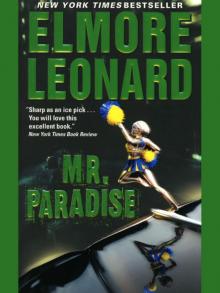 Mr. Paradise
Mr. Paradise The Hunted
The Hunted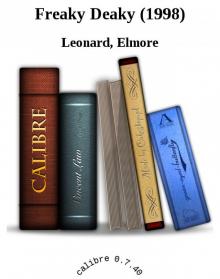 Freaky Deaky
Freaky Deaky Louly and Pretty Boy (Ss)
Louly and Pretty Boy (Ss)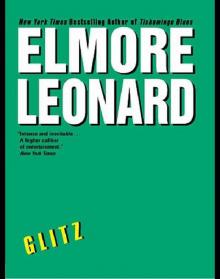 Glitz
Glitz A Coyote's in the House
A Coyote's in the House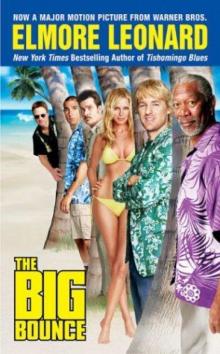 The Big Bounce jr-1
The Big Bounce jr-1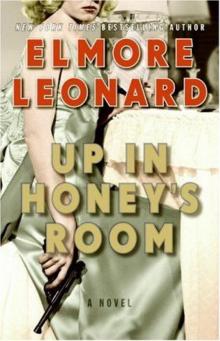 Up in Honey's Room cw-2
Up in Honey's Room cw-2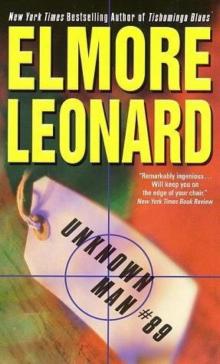 Unknown Man #89 jr-3
Unknown Man #89 jr-3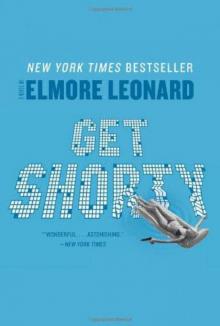 Get Shorty: A Novel cp-1
Get Shorty: A Novel cp-1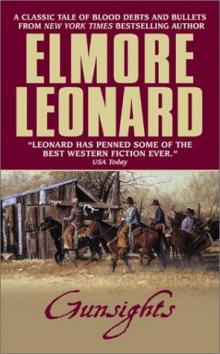 Gunsights
Gunsights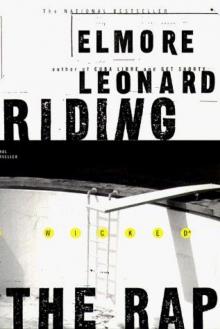 Riding the Rap rg-2
Riding the Rap rg-2